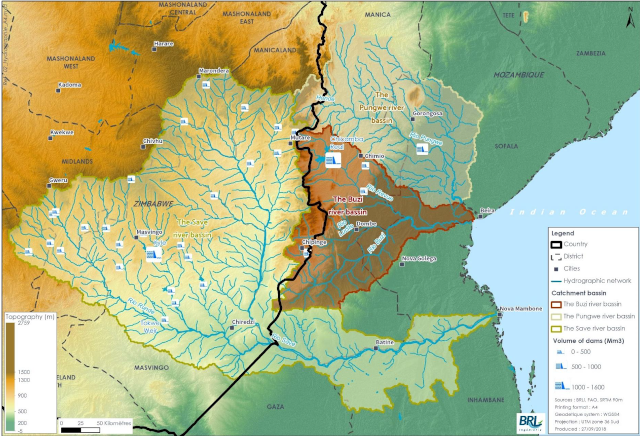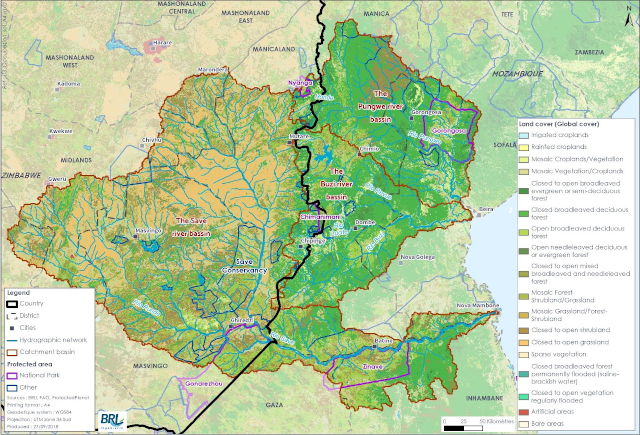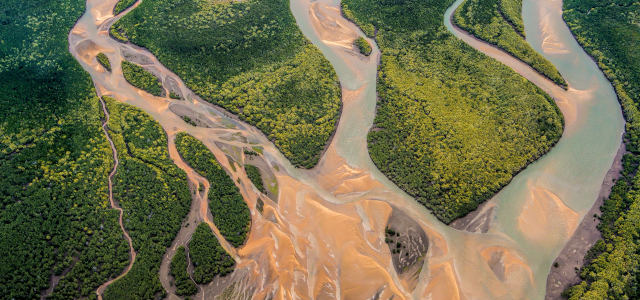Financing Partner: Global Environment Facility (GEF)
Implementing Agency: International Union for Conservation of Nature (IUCN)
Executing Agency: Global Water Partnership Southern Africa (GWPSA)
Duration: February 2021 - December 2024
Project Value: USD 6 million
Executing Agencies at National Level:
-
Mozambique: Ministry of Public Works, Housing, and Water Resources and Administração Regional de Águas - Centro (ARA-Centro)
-
Zimbabwe: Ministry of Lands, Agriculture, Fisheries, Water, and Rural Resettlement; and Zimbabwe National Water Authority (ZINWA)
Mozambique and Zimbabwe share at least five river basins or sub-basins; namely Limpopo, Zambezi, Pungwe, Buzi, and Save. The Pungwe, Buzi, and Save basins, collectively known as BUPUSA, are exclusively shared by the two countries and drain into the Indian Ocean. Water resources planning, development, and management of projects in the Pungwe, Buzi, and Save River basins rely on cooperation between the two countries.
The Management of competing water uses and associated ecosystems in Pungwe, Buzi, and Save Basins project targets the conservation, sustainable use, and risk mitigation of the transboundary water resources shared by Mozambique and Zimbabwe: Pungwe, Buzi, and Save River Basins. These three basins are located along the Beira corridor, an important economic corridor that links the Beira harbor to the hinterland, with associated impacts on the environment.
This project seeks to promote holistic approaches using the water-energy-food nexus, with specific interest in connected ecosystems. It has a focus on developing capacities for managing water resources and designing participatory and community-based strategies. Results and impacts will ensure increased transboundary water cooperation through promoting a coordinated approach for flood and drought risks management; mainstreaming of these risks in the decision-making process; strengthening capacities for water management; linking appropriate scales of intervention; increasing communities' autonomy and ownership in water-related risk management; and reducing the vulnerability of the local communities to floods and droughts.

Situation map of the Pungwe, Buzi, and Save basins
Project Objective
The objective of the project is to strengthen transboundary cooperation and management of water resources and associated ecosystems for improved water security, climate change resilience, and sustainable livelihoods in the shared Pungwe, Buzi, and Save basins, located in Mozambique and Zimbabwe.
Project Components and Outcomes
There are three components of the project. They, along with the associated outcomes, are listed below:
Component 1: Flood and drought warning and mitigation
Outcome 1.1: Flood and drought management in the Pungwe, Buzi, and Save River basins is improved and the related risks are mitigated
Outcome 1.2: Improved national and transboundary capacity for integrated management of floods and droughts
Component 2: Conserving and restoring ecosystems for sustainable livelihoods
Outcome 2.1: Improved water ecosystems of the Pungwe, Buzi, and Save River basins for sustainable functions and services for people and nature
Component 3: Integrated basin planning for the Pungwe, Buzi, and Save River basins
Outcome 3.1: The Mozambique and Zimbabwe JWC agrees on the updated shared water resources strategy and program for joint ecosystem-based management of the Pungwe, Buzi, and Save river basins
This project complements the national efforts to manage water resources within the basins and other projects being carried out, such as the Idai Recovery Project (IRP) to Zimbabwe, the Supporting Enhanced Climate Action for Low Carbon and Climate Resilient Development Pathway (SECA) Project, the Building River Dialogue and Governance (BRIDGE) Project Phase 4 implemented by IUCN, and the SADC-GMI's Sustainable Groundwater Management in SADC Member States Project.
This project recognizes that women are not adequately represented in positions of responsibility within civil society organizations and local institutions, including water resources management, and that women face significant barriers to securing resource rights. This project's activities have therefore been defined with the aim of ensuring gender equality in managing water resources in the three basins.

Land cover map of the Pungwe, Buzi, and Save basins
Implementing Arrangements
The execution and strategic orientation of the project will be under the overall responsibility of the JWC, composed of representatives of the Ministry of Public Works, Housing, and Water Resources of Mozambique and the Ministry of Lands, Agriculture, Fisheries, Water, and Rural Resettlement or Zimbabwe. The International Union for Conservation of Nature is the project's implementing agency, while GWPSA is the bilateral executing agency at regional level. Project implementation is being carried out by the Project Implementation Unit (PIU), housed in the Administração Regional de Águas do Centro (ARA) Centro Office in Beira, Mozambique, while the Project Steering Committee (PSC) assists and advises on the implementation of the activities.
For more information, read the Management of Competing Water Uses and Associated Ecosystems in Pungwe, Buzi, and Save Basins project brief in:
